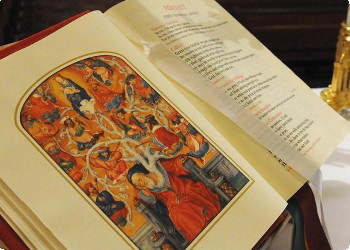He prophesied that Jesus was going to die for the nation
23 MARCH (Jn 11,45-56)
The prophecy of Caiaphas says the eternal truth of Jesus Christ: He is the Suffering Servant of the Lord. In this sense it is a true prophecy. A prophecy of God, in the Holy Spirit. The Letter to the Hebrews professes the same truth on Christ the Lord. Let us read carefully.
Therefore, we must attend all the more to what we have heard, so that we may not be carried away. For if the word announced through angels proved firm, and every transgression and disobedience received its just recompense, how shall we escape if we ignore so great a salvation? Announced originally through the Lord, it was confirmed for us by those who had heard. God added his testimony by signs, wonders, various acts of power, and distribution of the gifts of the holy Spirit according to his will. For it was not to angels that he subjected the world to come, of which we are speaking. Instead, someone has testified somewhere: “What is man that you are mindful of him, or the son of man that you care for him? You made him for a little while lower than the angels; you crowned him with glory and honor, subjecting all things under his feet.” In “subjecting” all things (to him), he left nothing not “subject to him.” Yet at present we do not see “all things subject to him,” but we do see Jesus “crowned with glory and honor” because he suffered death, he who “for a little while” was made “lower than the angels,” that by the grace of God he might taste death for everyone.
For it was fitting that he, for whom and through whom all things exist, in bringing many children to glory, should make the leader to their salvation perfect through suffering. He who consecrates and those who are being consecrated all have one origin. Therefore, he is not ashamed to call them “brothers,” saying: “I will proclaim your name to my brothers, in the midst of the assembly I will praise you”; and again: “I will put my trust in him”; and again: “Behold, I and the children God has given me.” Now since the children share in blood and flesh, he likewise shared in them, that through death he might destroy the one who has the power of death, that is, the devil, and free those who through fear of death had been subject to slavery all their life. Surely he did not help angels but rather the descendants of Abraham; therefore, he had to become like his brothers in every way, that he might be a merciful and faithful high priest before God to expiate the sins of the people. Because he himself was tested through what he suffered, he is able to help those who are being tested. (Heb 2,1-18).
What you must never do is to give fulfillment to the material prophecy. This is accomplished by itself. It must not be accomplished by anyone. One thing is that Jesus must die for the Jews and Pagans and another is to decide to kill him. The prophecy must always remain a word. Never must it be transformed into an act, into history, otherwise it is no longer a prophecy. It becomes a murder. The power to kill does not belong to the prophet. The power to proclaim the truth, only the truth him belongs to him. Nothing else.
Now many of the Jews who had come to Mary and seen what he had done began to believe in him. But some of them went to the Pharisees and told them what Jesus had done. So the chief priests and the Pharisees convened the Sanhedrin and said, “What are we going to do? This man is performing many signs. If we leave him alone, all will believe in him, and the Romans will come and take away both our land and our nation.” But one of them, Caiaphas, who was high priest that year, said to them, “You know nothing, nor do you consider that it is better for you that one man should die instead of the people, so that the whole nation may not perish.” He did not say this on his own, but since he was high priest for that year, he prophesied that Jesus was going to die for the nation, and not only for the nation, but also to gather into one the dispersed children of God. So from that day on they planned to kill him. So Jesus no longer walked about in public among the Jews, but he left for the region near the desert, to a town called Ephraim, and there he remained with his disciples. Now the Passover of the Jews was near, and many went up from the country to Jerusalem before Passover to purify themselves. They looked for Jesus and said to one another as they were in the temple area, “What do you think? That he will not come to the feast?”
Let us notice, once more, the utmost prudence of Jesus. Knowing that the Jews were looking to kill him, he retires in isolated places, where there is no possibility of unpleasant surprises. He did not yet attest to the truth in an official way in the Sanhedrin.
Virgin Mary, Mother of the Redemption, Angels and Saints make us always wise and prudent.





